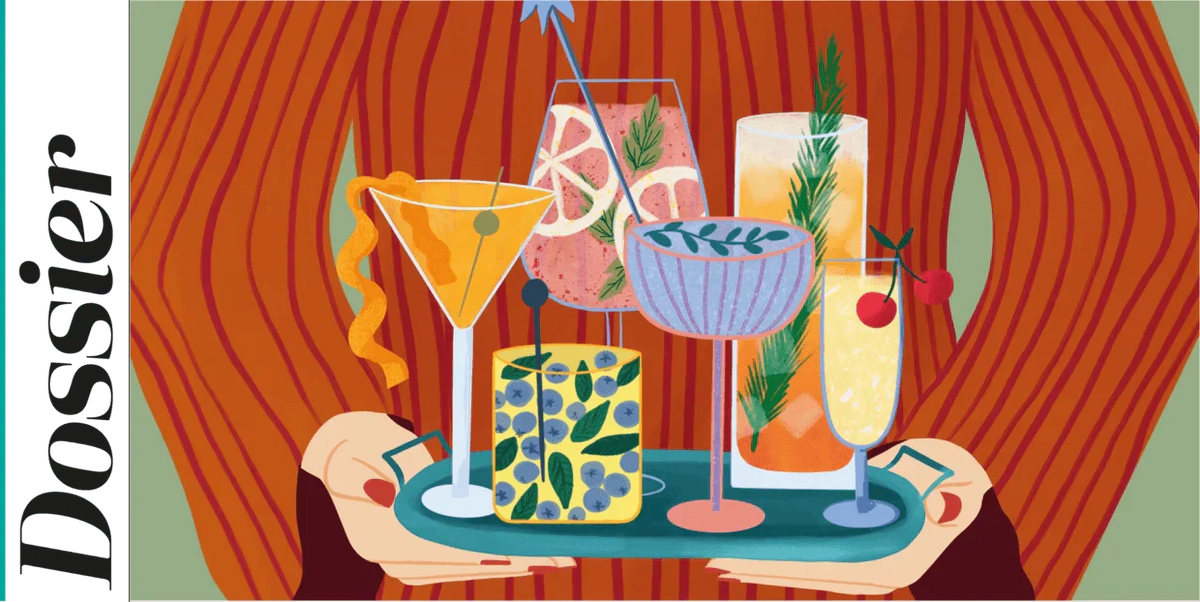Why cutting down on alcohol is always a good idea – and how to go about it
It is becoming increasingly clear that alcohol is really not good for you. Certainly not if you are a bit older. But it's so relaxing and fun. Although... Is that really the case? You may feel much better by cutting back.
Why do people drink alcohol?
Ninette van Hasselt:
“Alcohol has a physically relaxing effect. It appeals to your dopamine center, which releases the neurotransmitter gaba. The first glasses provide a happy feeling, the subsequent glasses have a narcotic effect. Your brain searches for the fastest and most efficient way to reduce stress. The first time you drank alcohol, you taught your brain that alcohol is relaxing. There's nothing wrong with coming home after a busy week at work and having a glass of wine. The problem is that you teach yourself to drink away stress. While you can also choose to relax without the harmful effects of alcohol: for example with a walk or a cup of tea.”
Tip
You can get non-alcoholic bubbles, wines, beers and aperitifs in the non-alcoholic liquor store World of Nix in Tilburg, Amsterdam and Haarlem. You can order online at worldofnix.com .
The Health Council says: do not drink, but in any case not more than one glass per day.
“Alcohol is linked to sixty different conditions. In any case, drinking alcohol lowers your resistance. In that sense you can say that there is no disease that is not alcohol-related. Alcohol has a proven link to seven types of cancer, including breast and colon cancer.”
People over 60 drink more than others.
“That is explainable: if there is a lot of time for social gatherings and fewer responsibilities, then more drunk . Death of loved ones and retirement are events that often occur in this phase of life and disrupt the 'system'. If alcohol becomes a factor in dealing with difficult things in your life, you have to be careful.”
For more information visit: ikpas.nl
A drink is normal, right?
We are fed with images that confirm that alcohol provides relaxation and conviviality, says Ninette van Hasselt. “In the so-called Barlab at Radboud University Nijmegen, research is being conducted into drinking behavior and how advertising and social factors influence it. From this we know that we are tempted to drink on a subconscious level. For example: anyone who has been confronted with a drink advertisement, even if it is not consciously remembered, will drink more. In short, the influence around drinking is enormous.”
44%
The percentage of adults who drink no alcohol or no more than one drink per day increased from 37.4% in 2014 to 41.5% in 2019 and increased further to 44.4% in 2020. Since then it has stabilized at around 44%.
Source: Trimbos.
Babette participated in Dry January.
“During the week I didn't drink much, except for the occasional specialty beer. But when I didn't have the kids for a weekend and went out, I drank a lot. How else was I supposed to relax and dance? I noticed that I no longer just went to the café or festival for fun and contact with friends, it was also about the alcohol buzz. The next day I regretted it. My participation in Dry January felt like a liberation from day one. No more hangover: how wonderful! I also thought: how nice would it be if my stomach could become a little flatter? After two weeks I knew that I wanted to last longer than that one month. One hundred days, that's what I was going for. After more than six months without alcohol, I'm going out again. Then I have a lot of fun. Without alcohol I am happier, I notice, more relaxed. I feel good. Literally and figuratively. I just keep partying and being crazy. Precisely because I have been freed from the idea of needing a drink.”
Help, your neighbor is drinking
Drinkers often don't like it when others don't drink along. As long as you go along with it and push your boundaries, the drinker doesn't have to change anything. Keep in mind that you are in a relationship with someone else. And a relationship is something that both parties contribute to; It is therefore best to confront the drinker with his/her drinking behavior and make demands about it. You can read how to do this skillfully in the step-by-step plan on vnn.nl.
Stop completely
Wine lover and entrepreneur Cynthia Schultz (lifestyle blog cynthia.nl ) decided to stop drinking overnight. In that process she encountered herself. She writes about that Alcohol-free. Drink less, live more .
Cynthia recommends that you do not reduce your intake of alcohol for two months, but that you stop drinking alcohol completely . “Because then you become aware of your behavior. What are you looking for in that glass? It offers space to think about what you can replace it with. After two months you can think: okay, how could I fit alcohol into my life? Set clear boundaries for yourself. Otherwise you create a gray area. For example: I am allowed a glass when I go out to eat, but not otherwise.”
Cynthia's tip: “I make sure I have tasty non-alcoholic drinks at home. Think of kombucha or crodino – with cheerful labels. When visitors come over who want a glass of wine, I also have something tasty and special for myself. Most cafes and restaurants these days have a good range of mocktails and 0.0. drinks. Allow yourself to replace the alcohol with something festive: rivella for example, in a nice glass with ice. That immediately looks nice.”
Be careful with medications
Because we are getting older, we are also more often confronted with chronic diseases and associated medications. And alcohol and medications don't go well together. The risk of falls increases and falls are a major cause of death among people over 60. Don't forget that as you get older you become less able to tolerate alcohol, so you have to be careful, especially in combination with medication.
Well prepared
What do you do if you are in an environment where there is a lot of drinking and you want to cut down?
- Count your drinks, that helps. Alternate with glasses of water.
- Speak out to others that you are not drinking for a period of time. This is how you create support for yourself.
- Think about the situations you encounter in which you are confronted with alcohol and the infamous statement: 'Don't be so stupid, what difference does one drink make?'. What then is the trigger that makes you start drinking even though you intended not to? Visualize such situations and make a plan to break them.
- Is there a party or dinner on your agenda and are you sure there will be heavy drinking? You can choose not to go the first few times. You don't need to tempt yourself unnecessarily, right? Source: vzinfo.nl
Feeling good
People who (temporarily) stop drinking notice a difference after just a few days . You sleep better, are happier more often and your skin looks better.
Margriet gives 5x Alcohol-free. Drink less, live more . Go to margriet.nl/alcoholvrij to have a chance.
Image: Mirjam de Ruiter (illustration)
Read the original article here .

Ingredients
No ingredients listed for this recipe.
Preparation method
No preparation steps listed for this recipe.





